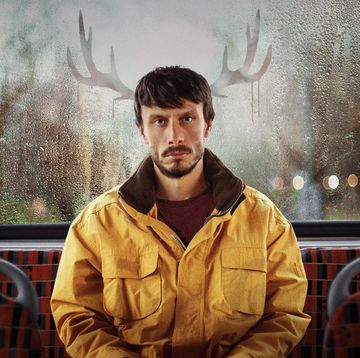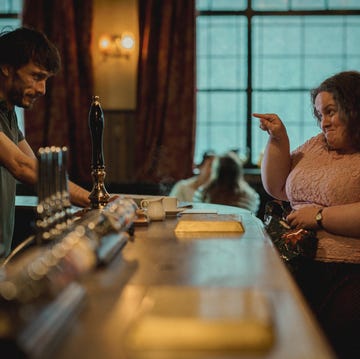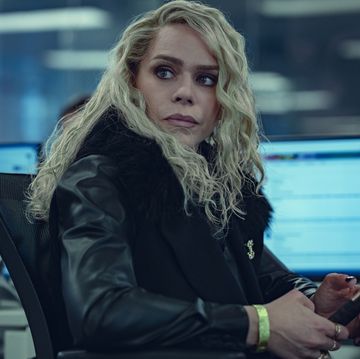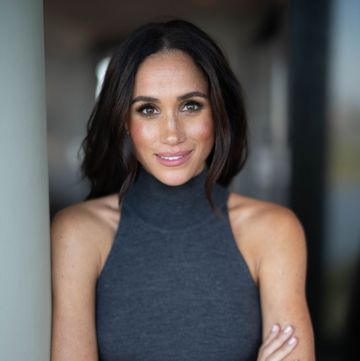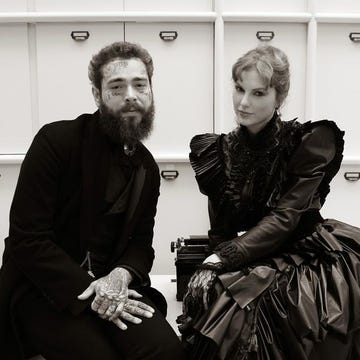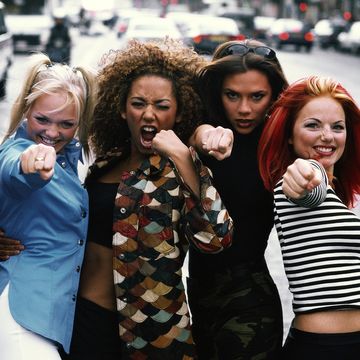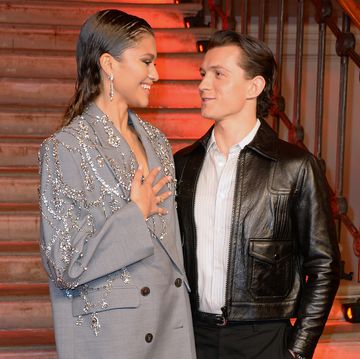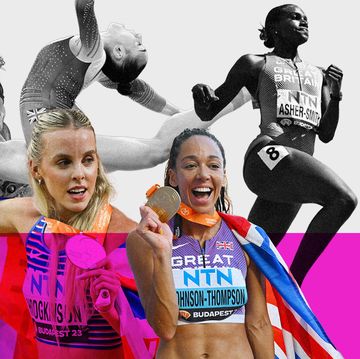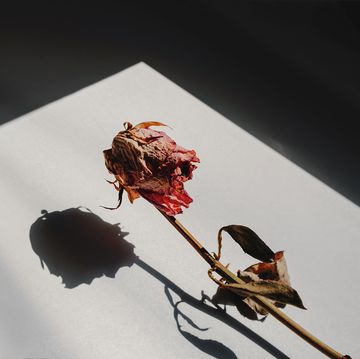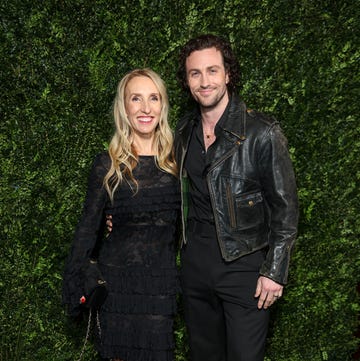At a time when gender identity is firmly in the spotlight, womanhood has never been so widely observed and analysed. But such a broad, abstract concept means something completely different to every woman. Is femininity just a performance, as gender theorist Judith Butler once argued? Or is our sense of womanhood beyond our control, shaped by early experiences in our childhood? Indeed, femininity is personal, complex and tied irrevocably to circumstances that we often have no control over. So the best way to understand is to listen to each other’s stories. And so we've asked three women with very different childhoods — one trans, one who grew up without a mother, and one who was a dedicated tomboy — to discuss how they defined femininity on their own unique terms.
Hari Neff, 22, is a New York-based model. She was the first transgender woman to be signed globally by IMG model agency and has starred in the Selfridges Agender campaign
For me, being a woman was a line of best fit. If I was a political radical who wanted to dedicate her whole life to the war on gender, I’d probably make a big statement about not having to be a man or a woman, but that’s not what I want to spend my time doing. So I looked at my options – of which there are basically two – and I chose the one that felt best.
I do feel a certain amount of pride as someone who completely constructed herself from the ground up. None of this was given to me – this body was not given to me and my standing as a woman was not given to me. I had to earn all of this for myself; every trans person has to make that for themselves and I think that’s why trans people are so strong.
When I was little, I didn’t think about my gender. I was just in the suburbs of Newton, Massachusetts, going to school, hanging out with my friends. There was no trans visibility. I didn’t really know what a trans person was until I was about 13, and then it was only people such as the cult New York celebrity Amanda Lepore, who I’d learned about via the arts nightlife scene on the internet. I didn’t have the exposure or the vocabulary about my body to communicate any dysmorphia.
Being a little boy was easy. Being a teenage boy was kind of easy too, because I was living in a post-gay-liberation world, so it was a very different gender space than a lot of previous queer people may have felt. I was raised primarily by my mother, so I had a lot of strong female authority and a lot of mother/daughter time in my early developmental years. That said, I think I was shamed for a lot of my more feminine impulses. As a child, I’d want the Barbie at Toys R Us, then I’d hide under the counter because I was ashamed. I remember asking for the princess toy at McDonald’s and not just seeing how uncomfortable that made the employees, but how it affected my parents. My mum was never too bad about it, but the male authority figures in my life were always trying to steer me in a different direction. Not because they’re bad people, but because they wanted to keep me safe. I don’t think they understood how to do that without shaming me.
I moved to New York when I was 18, and felt like I was in more of a safe space. The process was very fluid and organic – there was never an ‘aha’ moment for me. I was just going out and changing up my look, experimenting with drag. I didn’t dive into being a woman – I added elements piece by piece. The way I led my life just became more and more feminine and the only place left to go was transition. I felt like the way I saw myself didn’t really sync up with the way people saw me. I was shaving my eyebrows, had bleached hair and wore make-up. But I would walk down the street and people would think I was a boy and would still say ‘he’. It didn’t feel like they were attacking me; the way I always describe it is like when a child throws a toy at your face and it kind of bounces off and you think, ‘that hurt’, even though you know they didn’t mean it. That became my day-to-day life.
I think I internalised femininity through fashion and through pop culture, and started to create a woman in my head. People say that fashion has a limited idea of femininity, but it proposes so many different views of women and ideas that you don’t have in the mainstream. I began to attach desires and value judgements to things, and eventually understood that this woman was stronger and better equipped than I was to deal with the world. I came to the point where I had no doubt that I would be a better person, a happier person, if I inhabited her.
Life is different now. Aside from being a model, which has its own trials and tribulations, there’s more of a fixation on my appearance. There also came a point, a couple of months ago, when I noticed that men stopped listening to me when I talked. It’s all of the basic things about misogyny that I am just beginning to experience. There is also the element of being on hormone replacement therapy and essentially going through a second puberty. My emotions are up and down. All of this stuff is very new: some of it is chemical and some of it is cultural. Radical feminists ask, ‘Why would you ever want to be a woman? Why would you ever want to give up that male privilege?’ And I don’t really have an answer for that other than the burden of being a man, for me, was far more severe than anything I’ve experienced on the other side.
Once you’ve changed gender, the annoying aspects of daily life become secondary. I sweat the small stuff less. I’m very happy. I’m not saying that trans women are more evolved than other women, but I really do think they are the coolest, most beautiful people in the world because everything about them in relation to their gender, their appearance, the people they ‘are’, they built. And while I do want to advocate for the trans community as much as I can, my relationship to femininity and gender isn’t universal. There are many different ways to be trans.
Catriona Marshall, 26, is a Paris-based economist. As a child and teenager growing up in London, she was a committed tomboy who dedicated her life to sport
I’m the youngest of three girls. From the start my elder sisters both cared about fashion and beauty – one is a fashion curator now and the other is in PR. They really were great at everything, and when you have siblings that excel at school and have lots of friends, you want to find something that’s yours. We all did a lot of sport, but I always did more and that was the thing that differentiated me. It helped me to be unique and have my own identity. I was a total tomboy and being one of the boys by learning to skateboard or running around outside was probably my way of saying, ‘Well, I can’t play violin, I can’t play piano, I can’t do ballet like you guys, but I’m still cool and good at something.’
I started gymnastics when I was two and I ended up doing it for Great Britain. By the time I was 10, I was training 40 hours a week. I would go to the gym at 5am, finish at 9am, go into school late, go straight back to the gym at 4.30pm, eating my dinner and doing my homework quickly on the way, and stay there until 9pm. It meant that I didn’t have time for anything else. I didn’t really develop tastes, I just needed clothes that were convenient, comfortable and good for travel as I went all round the world competing.
Sport had a physical effect on me – I did so much, my body didn’t develop and I hit puberty much later. I think that contributed to me being a tomboy. But I remember watching girls run around the school field at about 13 with big boobs thinking, ‘Thank god I don’t have that. Thank god I can wear a T-shirt with no bra.’ I suppose I didn’t really want to have a girlie body, because it would have made it much harder to do sports at that level. Because I was training, I also wasn’t interested in fashion or kissing boys – I didn’t care about wearing a nice dress to the school dance because I didn’t care about going to the school dance – I was too busy.
Between the ages of 12 and 16 I lived with my dad, Thomas. My mum, Sheila, and my sisters, Moira and Shonagh, moved to Norwich, but I stayed in London to do gymnastics. Those really are important years and I think I underestimate the impact they had on me. I always had my sisters on the phone, but I didn’t have somebody there day-to-day being like, ‘I don’t think that you should wear that giant Nirvana T-shirt and those baggy jeans.’ I think I did miss out on the censoring part of having sisters – and the [clothes] borrowing. My dad was an air traffic controller, but his passion was economics. He loved reading the Financial Times. His friends would come round [to discuss finance], and I wanted to talk about it and be taken seriously by them. I don’t think I consciously decided to go into a male-dominated field, but maybe I wouldn’t have realised what I was interested in if I hadn’t been trying to have conversations about finance with grumpy old men. I think that working in economics has caused me to retain some of my more masculine elements. I am always trying to be taken seriously, which is easier if you’re in a suit.
I was definitely influenced by my surroundings. I do think a lot of my tomboy spirit was environmental, because as soon as I was older and was doing less sport and living with my sisters, I immediately thought how much I liked all the cool clothes they were wearing and what would suit me. I started to borrow their things and that’s when my girlier side developed, because it was there in front of me.
I also think I’d grown up a bit and had realised that things weren’t so black and white, or that there wasn’t such a clear line – it wasn’t that you’re either a girl who’s into fashion and lipstick and hanging around the shopping centre, or you’re someone who’s going to hang out outside doing something fun with the boys. I realise you could be someone in the middle and develop your own style.
Today, I do wonder if I’m still a tomboy or not. I think if somebody met me for the first time, they’d say no. You can’t tell on the surface – I have [feminine] hair and I do like clothes – but I think it’s still there in my personality.
I worry sometimes when I see young girls with expensive clothes and handbags when they’re only 10 or 11. While in some ways gender identity has changed and things are a lot more open now, I think there is more pressure to have style and be a young adult much earlier. I remember being able to not worry. It was OK for a kid to be a kid and to wear the same thing over and over. With celebrity culture and easy access to the media, it’s so much harder for young girls not to feel the need to look girlie like the singers, models and actresses that they’re seeing on Instagram all day. When I was that age, being boyish was wonderful – it really was just the freest and funnest thing I could do.
Megan Krueger, 29, is studying English Literature at the University of Wisconsin-La Crosse and working at an animal shelter. She grew up without a mother for the majority of her life
My mother disappeared in 1989, when I was three. She was working in PR and came home from work saying she had a last-minute conference the next day; she left at 4.30am with her bags packed to go to the airport. Apparently there was a car waiting for her out front. My dad, Tracey, got me up and ready to go to my grandparents’ that morning and he went to work. He was there for about an hour when my mother’s work called him and asked where she was. My dad said that she was at the conference, and her boss said there was no such thing taking place. Today, she is still a missing person. Well, technically, I think she was declared dead after seven years of being missing. It’s been 26 years now and there are still no answers.
I was so young that I don’t really remember her. I have a few snippets of one-second scenes in my head, like being in the shower with her or running in the kitchen while she was talking with my dad. But overall I just remember growing up with my dad and my grandparents, and it was normal. My dad says I asked a few times where Mummy was, but I don’t remember having those moments, which I think is a good thing.
Because of my grandmother, I did have a strong female presence to learn from. She grew up in Europe in the Great Depression so was an amazingly tough German woman. I think that my family was hit by so much tragedy that really, rather than the soft side of femininity, it was more about being a strong Rosie the Riveter type. As a woman, you do need to have a sense of independence and be able to take care of yourself. A lot of women really put everyone else first, but you don’t truly become complete until you learn how to treat yourself well.
I failed miserably at that when I was about 18 or 19. I wasn’t happy during my first year of college, so I decided to stay home and not return, and my dad and grandparents weren’t pleased – they wanted me to continue my studies. They said, ‘You’re still under our roof, you need to obey our rules.’ So I moved into this crappy one-room apartment and within a few months I was barely paying any of my bills, my water and electricity got turned off and I had eviction notices. I was in a very abusive relationship that lasted about a year and a half and I ended up getting pregnant at 19. Eventually, I got that boyfriend sent to jail and I put the baby up for adoption shortly after she was born. That was my hardest time, but it’s when I truly learned about motherhood and the importance of a strong maternal figure, because I knew the best thing for my baby was to be with people who could take care of her. I knew how much I loved her and I knew I was doing the right thing and that’s when I started to confront the ghosts, learn more about my mother, ask more questions and let myself really feel.
For a long time, I resented her. I just felt like she left [me]. I would see pictures of her and I didn’t find her pretty because she had a short haircut, which I hated. But over the years, through speaking to my family and reading her old diaries, I’ve realised she was clearly very depressed. I honestly believe she did leave on her own [terms] and felt she would be giving us a better life without her. Now, I find her so interesting and beautiful.
It’s funny thinking about that whole nature/nurture thing, as I really am a lot like her. She was a journalist and I have the articles she wrote for the local paper. There are things she says that remind me of myself – when she wrote them she was the same age as I am now.
Now I even pay more attention to her style and try to bring it into my life a bit more. I do have some of her old jewellery that I wear a lot, especially her pearl necklaces and coral earrings. I also find pictures of her back in the 1980s wearing certain colours or patterns and I’ll think, ‘Oh, those are my favourite colours,’ or, ‘I really like stripes.’ They are small things, but it’s a way to connect. Because I don’t remember her, sometimes I feel like the story of her is just a fairy tale. Finding similarities makes her seem real.
For years I used to look back and beat myself up because of mistakes I’d made and ways I’d acted. I think that’s how I allowed myself to stay in an abusive relationship, because really I was abusing myself by being so angry all the time. Not doing that is hard – it’s difficult for any woman, whether you’ve had a traditional upbringing or not. It took me many years to realise I can’t change the past, but I can change myself. I still don’t feel fully complete in who I want to be. I have a lot of work to do, but I’ve realised that I can achieve my goals, even if it’s later in life.


